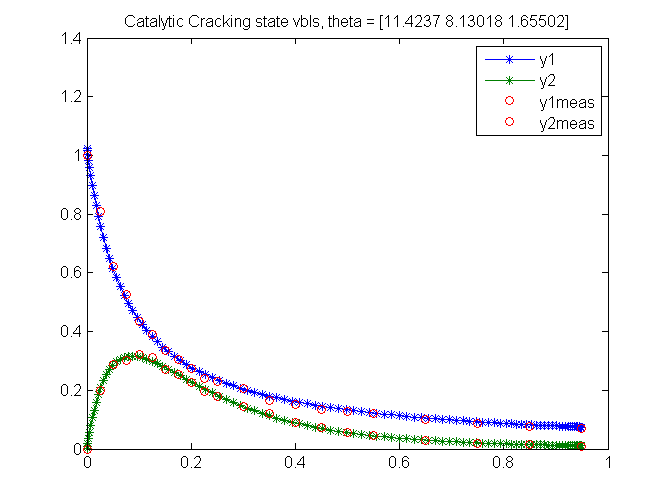PROPT Catalytic Cracking of Gas Oil: Difference between revisions
From TomWiki
Jump to navigationJump to search
(Created page with "{{Part Of Manual|title=the PROPT Manual|link=PROPT Manual}} Benchmarking Optimization Software with COPS Elizabeth D. Dolan and Jorge J. More ARGONNE NATIONAL LABOR...") |
No edit summary |
||
| Line 1: | Line 1: | ||
{{Part Of Manual|title=the PROPT | {{Part Of Manual|title=the PROPT Manual|link=[[PROPT|PROPT Manual]]}} | ||
Benchmarking Optimization Software with COPS Elizabeth D. Dolan and Jorge J. More ARGONNE NATIONAL LABORATORY | Benchmarking Optimization Software with COPS Elizabeth D. Dolan and Jorge J. More ARGONNE NATIONAL LABORATORY | ||
| Line 106: | Line 106: | ||
title(sprintf('Catalytic Cracking state vbls, theta = [%g %g %g]',t1,t2,t3)); | title(sprintf('Catalytic Cracking state vbls, theta = [%g %g %g]',t1,t2,t3)); | ||
</source> | </source> | ||
[[File:catalyticCracking_01.png]] | |||
Revision as of 14:22, 2 November 2011
|
This page is part of the PROPT Manual. See PROPT Manual. |
Benchmarking Optimization Software with COPS Elizabeth D. Dolan and Jorge J. More ARGONNE NATIONAL LABORATORY
Problem Formulation
Find theta over t in [0; 0.95] to minimize
subject to:
Where the data is given in the code.
% Copyright (c) 2007-2008 by Tomlab Optimization Inc.Problem setup
toms t theta1 theta2 theta3
p = tomPhase('p', t, 0, 0.95, 100);
setPhase(p);
tomStates y1 y2
% Initial guess
x0 = icollocate({
y1 == 1-(1-0.069)*t/0.95
y2 == 0.01*t/0.95});
% Box constraints
cbox = {0 <= theta1; 0 <= theta2; 0 <= theta3};
% Various constants and expressions
y1meas = [1.0;0.8105;0.6208;0.5258;0.4345;0.3903;...
0.3342;0.3034;0.2735;0.2405;0.2283;0.2071;0.1669;...
0.153;0.1339;0.1265;0.12;0.099;0.087;0.077;0.069];
y2meas = [0;0.2;0.2886;0.301;0.3215;0.3123;0.2716;...
0.2551;0.2258;0.1959;0.1789;0.1457;0.1198;0.0909...
;0.0719;0.0561;0.046;0.028;0.019;0.014;0.010];
tmeas = [0;0.025;0.05;0.075;0.1;0.125;...
0.15;0.175;0.2;0.225;0.25;0.3;0.35;0.4;...
0.45;0.5;0.55;0.65;0.75;0.85;0.95];
y1err = atPoints(tmeas,y1) - y1meas;
y2err = atPoints(tmeas,y2) - y2meas;
% ODEs and path constraints
ceq = collocate({
dot(y1) == -(theta1+theta3)*y1.^2
dot(y2) == theta1*y1.^2-theta2*y2});
% Objective
objective = sum(y1err.^2)+sum(y2err.^2);Solve the problem
options = struct;
options.name = 'Catalytic Cracking';
solution = ezsolve(objective, {cbox, ceq}, x0, options);
t = subs(collocate(t),solution);
y1 = subs(collocate(y1),solution);
y2 = subs(collocate(y2),solution);
theta1 = subs(theta1,solution);
theta2 = subs(theta2,solution);
theta3 = subs(theta3,solution);Problem type appears to be: qpcon
Time for symbolic processing: 0.13569 seconds
Starting numeric solver
===== * * * =================================================================== * * *
TOMLAB - TOMLAB Development license 999007. Valid to 2011-12-31
=====================================================================================
Problem: --- 1: Catalytic Cracking f_k 0.004326020490938554
sum(|constr|) 0.000000000508288956
f(x_k) + sum(|constr|) 0.004326020999227510
f(x_0) 0.165642328947365690
Solver: snopt. EXIT=0. INFORM=1.
SNOPT 7.2-5 NLP code
Optimality conditions satisfied
FuncEv 1 ConstrEv 38 ConJacEv 38 Iter 29 MinorIter 238
CPU time: 0.561604 sec. Elapsed time: 0.598000 sec.
Plot result
figure(1);
tm = tmeas; y1m = y1meas; y2m = y2meas;
t1 = theta1; t2 = theta2; t3 = theta3;
plot(t,y1,'*-',t,y2,'*-',tm,y1m,'ro',tm,y2m,'ro');
legend('y1','y2','y1meas','y2meas');
title(sprintf('Catalytic Cracking state vbls, theta = [%g %g %g]',t1,t2,t3));



